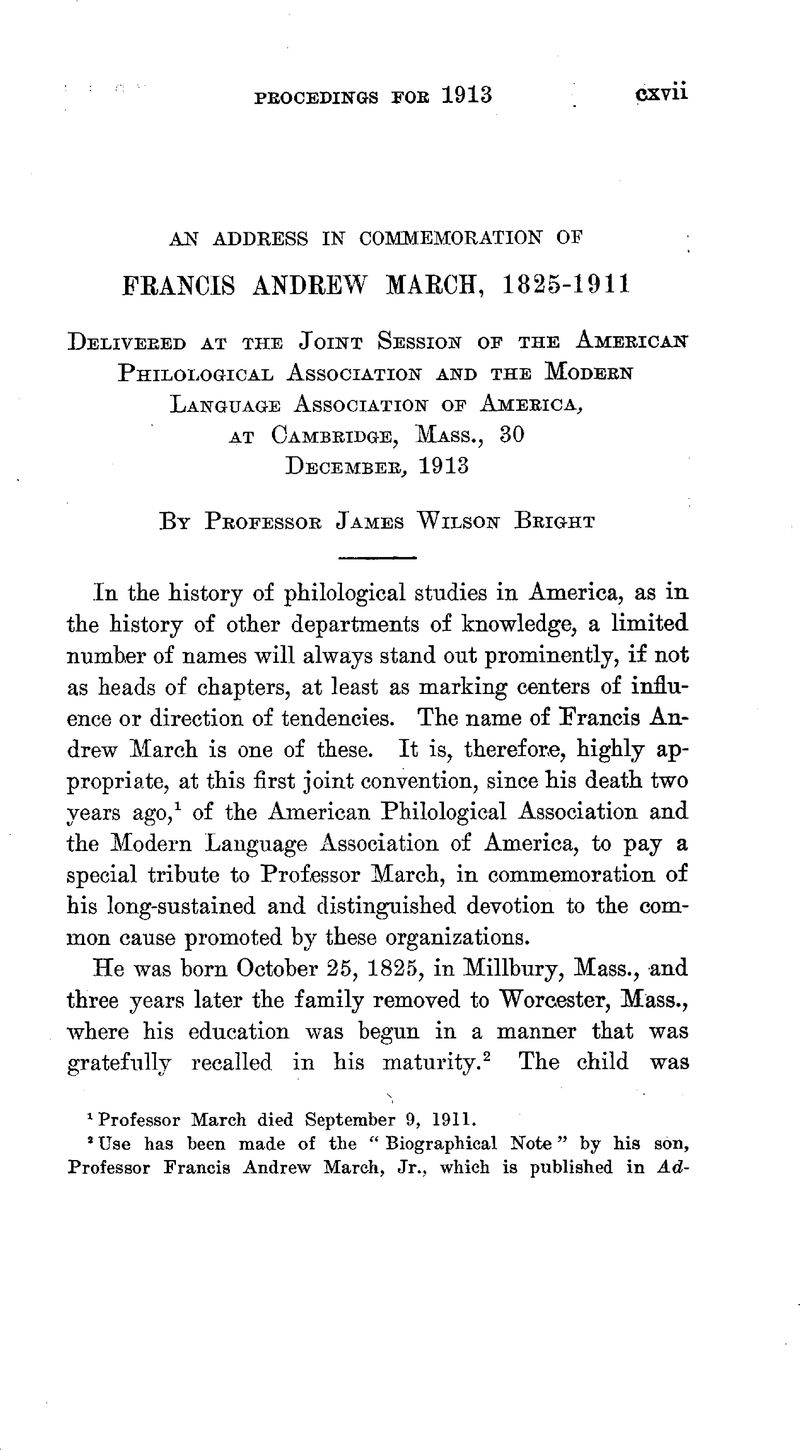Article contents
An Address in Commemoration of Francis Andrew March, 1825-1911
Published online by Cambridge University Press: 02 December 2020
Abstract

Information
- Type
- Other
- Information
- Copyright
- Copyright © Modern Language Association of America, 1914
References
page cxvii note 1 Professor March died September 9, 1911.
page cxvii note 2 Use has been made of the “Biographical Note” by his son, Professor Francis Andrew March, Jr., which is published in Addresses delivered at a celebration in honor of Professor Francis A. March, LL. D., L. H. D., at Lafayette College, October 25, 1895. Easton, Pa., Lafayette Press, 1895. The reader may also be referred to a pamphlet prepared by Richard N. Hart, entitled Francis Andrew March: a Sketch. Easton, Pa., 1907.
page cxviii note 3 His father, Andrew, removing to Worcester had “entered upon various business projects, particularly the manufacture of fine cutlery, one of the first enterprises of this character in this country, and for which it was necessary to import English workmen.” But now his partner in the cutlery business had defrauded him, and by fire he had sustained further loss, finally even that of his own residence.
page cxix note 4 Some of these are enumerated in the “Biographical Note”: Hon. Henry Stockbridge, of Baltimore; Professor Marshall Henshaw, of Rutgers; J. R. Bingham, Esq., of Milwaukee; and “preachers better known in India and Zululand and through the wilds of the west—Noyes, Tyler, Packard, Woodworth.”
page cxx note 5 It is to be noticed also that in March's Method there is the acknowledgment that “the name and form of this book are taken from the Method of Classical Study, by Dr. [Samuel Harvey] Taylor, of Andover [1861].”
page cxx note 6 It is interesting to repeat the report that this oration was much praised, and that it was heard and approved by Rufus Choate. It was published in the New Englander for October of that year, and is the first number on the list of Professor March's publications.
page cxxi note 7 Tradition has preserved the words in which Dr. McPhail expressed his enthusiastic judgment: “I know a young man who is just the one you want…. He knows more than all of us. It is Mr. March of Fredericksburg.” Dr. McPhail was President of Lafayette College from 1857 to 1863.
page cxxii note 8 Professor March retired from active service in the year 1906, but as Professor Emeritus he continued to the end to be influential and revered in the councils of the college.
page cxxiii note 9 His study of the national Constitution led him to prepare “a scheme of amendments … intended to bring about a peaceful settlement of the difficulties between the North and South, which he advocated by letters to the New York Times and World [1860-1861]. These amendments attracted much attention, and were introduced in Congress, in the Virginia legislature and elsewhere.”—“Biographical Note,” p. 18.
At this time he also made an important contribution to philosophic thought in two articles on Sir William Hamilton's “Theory of Perception,” and “Philosophy of the Conditioned,” published in The Biblical Repertory and Princeton Review, April and July, 1860. The second article was reprinted in The British and Foreign Evangelical Review, Edinburgh, Jan., 1861. These articles brought him into friendly relations with Dr. James McCosh (then still in Ireland) and Victor Cousin.—“Biographical Note,” p. 17.
page cxxxi note 10 Professor March expressed his view on the usefulness of technical terms in words that may be cited also to illustrate the playful range of his illustrations: “Now and then he would have been clearer even to general readers if he had used precise technical terms instead of indefinite popular expressions…. Scientific treatment which abjures technicalities cannot be very exact…. The stupidest land-lubber gets more from the sailor's technical slang than from any explanatory circumlocutions for it.” Review of Morris's Historical Outlines of English Accidence, in The Nation, September 5, 1872, p. 154.
page cxxxii note 11 The Presbyterian Quarterly and Princeton Review, N. S. iii (1874), 713.
page cxxxiii note 12 He laments that “some professors of Greek should be foremost in desiring to reduce the study of Greek to an elective branch and to treat it as a select and rare form of intellectual culture, like Quaternions or Anglo-Saxon or Icelandic.” The Princeton Review for September, 1883, p. 127. This reference is also applicable to Publications of the Modern Language Association of America, xviii, p. xlv.
page cxxxiv note 13 See Addresses mentioned in the first foot-note.
page cxxxiv note 14 For an illustration of Professor March's advocacy of this view, see The Presbyterian Quarterly and Princeton Review, N. S. iii (1874), 712. See also Professor Gildersleeve's reminiscences in The American Journal of Philology, xxv (1904), 484.
- 2
- Cited by

